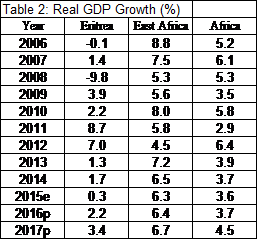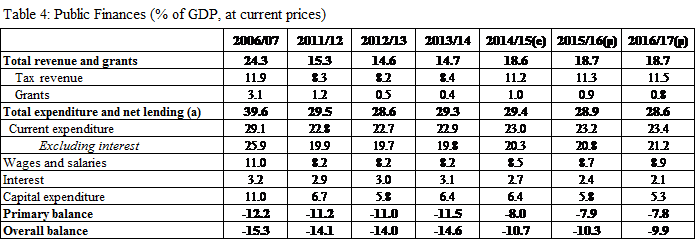PBS: Escaping Eritrea … [Read More...] about ካብ ውሽጢ ቤት ማእሰርታት ኤርትራ
BACK2KCAB: Some Notes on Eritrea’s Economy & Notes on Some Notes
Dr. Fikrejesus Amahazion | February 2017 [undated] | madote.com
Some Notes on Eritrea’s Economy
According to the recently published Global Economic Prospects, a World Bank Group flagship report, the year 2016 was marked by stagnant global trade, subdued investment, and heightened policy uncertainty. For 2017, a subdued recovery is expected, with receding obstacles to activity in commodity exporters and solid domestic demand in commodity importers. Additionally, weak investment is weighing on medium-term prospects across many emerging markets and developing economies (EMDEs). Although fiscal stimulus in major economies, if implemented, may boost global growth above expectations, risks to growth forecasts remain tilted to the downside.
For Eritrea, GDP growth was slightly above 4% in 2016, outpacing the global average, as well as GDP growth in the advanced economies, developing economies, and Africa (see figure 1). As well, Eritrea’s projected growth for the next several years is expected to outpace global projections (see figure 2). Importantly, such economic growth can be central to poverty reduction and the realization of broader development goals. Moving forward, Eritrea can address several areas in order to sustain positive economic momentum and enhance overall development.
Manufacturing and skills development
An area Eritrea should prioritize is manufacturing and skills development. As Eritrea continues to grow and integrate into the broader regional and global economy, it is vital to raise and vary exports, moving away from low-value added and potentially unstable primary products. Manufacturing is essential to growth, and with rapid technical change and global economic integration, it is becoming important as a means of modernizing and diversifying the economic base.
Consequently, focusing on and investing in technical and vocational programs and human capital development are key since they can help build and refine the population’s skills and capabilities to compete within fiercely competitive markets. Notably, advanced skills are not just a requirement for “hi-tech” sectors; even supposedly “simple” areas such as apparel, footwear, and basic engineering products require a degree of skills to compete. Of further importance, a skilled, knowledgeable workforce dramatically improves the investment climate since trained, skilled workers create an attractive economic environment for investors.
Beyond their necessity for competing in regional or global markets, Eritrea should invest in technical and vocational skills programs and human capital development since they help in the fulfillment of a range of fundamental human rights, significantly contribute to social inclusion, can considerably raise productivity and earnings (particularly of the working poor), reduce unemployment, increase the efficiency of entrepreneurs, and play positive, influential roles in crime and poverty reduction (AfDB; BCG; World Bank 2014).
The importance of technical and vocational skills and human capital development is particularly apparent in relation to skills gaps. Skills gaps are prevalent across much of the developing world – such as in Eritrea – and they persist despite generally high unemployment rates. Potential workers, lacking the skills and training required by various industries, remain idle and unproductive. An insightful case is Sri Lanka; while the country has the most educated workforce in South Asia, with 87 percent of citizens completing secondary school, its workforce is not equipped with the right skills to be machine operators, technicians, sales associates, and managers (World Bank 2014). In this context, vocational and technical training programs can provide workers with the vital skills required by dynamic, evolving economies, and can ultimately help address problems of unemployment and lack of productivity (BCG).
Notably, skills acquired from or honed within technical and vocational programs are especially significant for youth. Young people frequently remain at the end of the job queue for the formal labor market because they lack adequate skills and experience (Boateng 2002). With little access to formal employment, youth may instead turn to the informal sector. While the informal sector can frequently offer certain tangible benefits, it can also be characterized by long, unpredictable hours and limited protections, returns, safety, or security. More problematically, youth unemployment can also potentially lead to emigration, or crime and other harmful or dangerous behaviors, such as sex work or illicit drug use.
Overall, vocational and technical programs and human capital development are critical elements in encouraging and accelerating development, inclusive growth, and poverty reduction through economic transformation and job creation (AfDB). Moving forward, Eritrea should continue to invest in vocational and technical programs, and seek to enhance their overall effectiveness and impact. Doing so will require firm political commitment, the ongoing participation and cooperation of local and international partners, sustainable financing (especially for infrastructure and equipment), and the foresight to ensure that expansion does not dilute the quality of training.
To augment impact, the potential for enterprise-based training should be explored, while technical and vocational programs should be carefully assessed, diversified, and matched with the skills required by the labor market, possibly with the active participation of employers (Kanyenze, Mhone and Spareboom 2000; World Bank 2014). An illustrative example is the system of productivity councils that was a fundamental component of the rapid growth and success of the East Asian economies. Specifically, the system involved the specific skills profile required by the private sector being fed directly into the curricula of the educational and technical sector.
Finally, the Eritrean government and relevant stakeholders can further develop awareness campaigns illustrating that technical and vocational programs are an important means of empowering individuals to fully develop their capabilities and tangibly improve their lives. Importantly, these campaigns will help garner greater attention and participation, while counteracting potential obstacles related to perceptions of the alleged low prestige of technical and vocational programs.
Fisheries
Eritrea’s coastline on the Red Sea is approximately 1200 kilometers, making it one of the longest in the world, with approximately 1000 kilometers more coming from its numerous islands on the Red Sea. Notably, the waters of the southern part of the Red Sea are highly productive and rich in biodiversity, with substantial populations of over 1000 species of fish. Commercially valuable fish include groupers, snappers, emperors, lizardfish, breams, jacks, trevallies, mackerels, tunas, sharks, sardines, and anchovies.
However, while the region, which includes hundreds of islands as well as the major ports of Massawa in central Eritrea and Assab in the south, has a potential yield of 80000 metric tons of fish per year, Eritrea’s annual total capture production remains quite low. Thus, not only can the fisheries sector play an important role for poverty reduction, employment, income generation, food security (e.g. through reducing the need to depend on food imports to fill gaps), and nutrition (e.g. fish products are an important source of animal protein and essential micronutrients for balanced nutrition and good health), it also holds the potential to be a significant export industry and thus contribute to overall development and growth.
It is imperative, however, that Eritrea develop this sector in environmentally-friendly, sustainable ways. Proper management can avoid pollution and destructive fishing practices, ultimately ensuring the continued productivity of coastal waters and future growth, food security and jobs for coastal communities.
Tourism
Globally, the tourism industry accounts for about 10 percent of global GDP and one out of every 11 jobs. Tourism is an important foreign exchange earner, and many countries encourage tourism to help promote development and economic growth. The conclusion that tourism benefits nations’ economies applies both to developed nations and developing countries, although the effect may be stronger for less-developed countries with a relatively simple economy – such as Eritrea (Sahli and Carey 2013).
For Eritrea, a country blessed with a warm, hospitable climate, rich cultural heritage, and great natural assets, the tourism sector holds enormous potential to reduce poverty and enhance economic growth. However, the country must remain committed to the continued development of basic infrastructure (e.g. roads and airport facilities). Furthermore, the experience of countries that have developed successful tourism sectors (e.g. the Association of Southeast Asian Nations [ASEAN]) can offer important lessons for Eritrea, particularly in terms of improving connectivity, visa facilitation, and services. While tourism can promote growth and development, Eritrea must also make efforts to minimize or avoid potential adverse effects (e.g. on environment, cultural heritage, or local communities).






